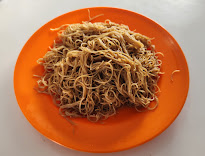Kudat is recognized as a Hakka town because her founding migrants were mostly Chinese Hakka who came from the Guangdong Province of China in the late 1800's.
For our breakfast on 26.09.2024, I decided to look for one old traditional Chinese coffee shop. An internet search led us to Kedai Kopi Lok Kheng Lim. As I have expected based on the word "Kheng" in the name of the shop, the coffee shop is run by Hainanese as confirmed by the proprietor lady who manned the counter. She told me she is Hakka and her husband is Hainanese. The coffee shop is more than 70 years old. It first started operating in the old Kudat town for over 40 years and then moved to its current premise more than 20 years ago.
 |
Teresa loves graffiti and she was happy to pose beside this painting of traditional old coffee shop setting painted on the exterior of the coffee shop. |
Typical of traditional coffee shop, this outlet serves dim sum, roti kahwin (toast bread), boiled eggs and and a variety of mee. I noticed that it is mee kosong (mee ekonomi) which is the most popular among the patrons.
Mee Kosong and Meehon Kosong.
We too ordered both mee kosong and meehon kosong to reminiscence the old days of eating this economic mee (經濟麵). I recall eating this mee wrapped in Simpoh Air leaf sold in the school canteen of my primary school in the 1950's. It costed 10 cents per pack then compared to RM3 per plate now! That's 300 times increase after 60 years!
.jpg) |
| Mee wrapped in Simpoh Air leave. |
 |
| Simpoh Air leaves. |
***************************************************
Before leaving Kudat, we stopped at the Basel Christian Church of Malaysia (BCCM) at Lau San. This is the oldest Church of BCCM. The original attap church building was built in 1886 by the first 10 families of migrants from China.
Chinese migrants left their home country for a new country in Southeast Asia because of two reasons. Soon after the failed Taiping Rebellion, the Hakka speaking Christians affiliated with the Basel Mission were viewed with suspicion by the Qing government as the leader of the rebellion, Hong Xiuquan was himself a Hakka. This resulted many Hakka speaking Chinese leaving China for Southeast Asia. Secondly, many hoped to seek new economic opportunity in a new country with the hope of reversing their hard lives in China.

.jpg)

.jpg)








Very interesting references to the history of Basel Church and the Hakka people to research further into. I had a read on some of the Wikipedia information and there are so many layers to the history
ReplyDelete